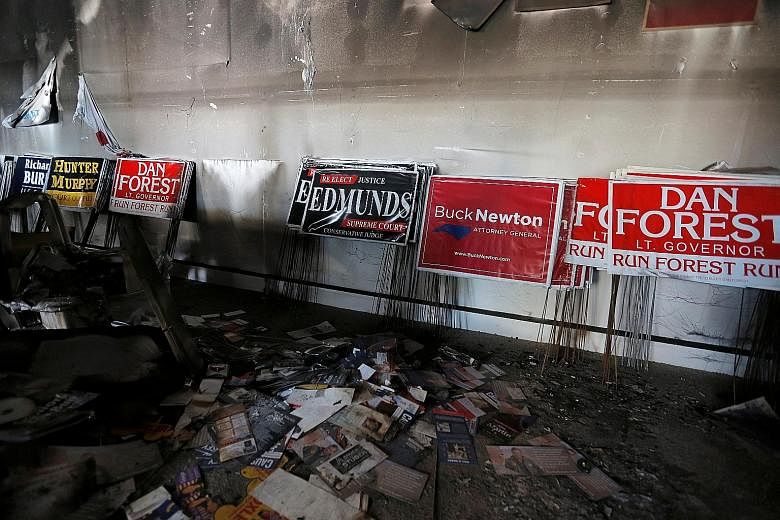There is very little likelihood of fraud in the Nov 8 US presidential election, political pundits say - but worries remain over the potential for political violence in some areas.
Although the United States has a history of political violence, this has diminished in recent years.
But the number of hate groups and armed militias is rising - anti-government "patriot" groups espousing violence rose from 874 in 2014 to 998 last year, and the number of right-wing groups now exceeds a previous high point in the 1990s, says the Southern Poverty Law Centre (SPLC).
"Hate groups" are defined as those with "beliefs or practices that attack or malign an entire class of people", says the SPLC, which lists 892 such groups in the country.
Two Fridays ago, the Federal Bureau of Investigation (FBI) arrested three Kansas men who were allegedly part of a domestic terrorist group called "the Crusaders" and charged them with plotting to carry out a massive attack, with stockpiled firearms and explosives, on Muslim immigrants in Garden City, a town of about 26,000.
-
874
Number of anti-government "patriot" groups espousing violence in 2014.
998
Number of such groups in 2015.
The men, in their late 40s, belonged to a group that espoused "sovereign citizen, anti-government, anti-Muslim and anti-immigrant extremist beliefs", according to an FBI agent's affidavit, local media reported.
The trio allegedly planned the attack for Nov 9 - the day after the presidential election - to "wake people up".
In another incident, on Oct 16, an improvised bomb was thrown into a Republican Party office in Hillsborough, South Carolina - a small town of 6,000-odd people with no history of political animosity. And spray-painted on a nearby wall were the words "Nazi Republicans leave town or else".
In a new brief, the New York- based Soufan Group, a security and risk consultancy, has warned that "the rhetoric surrounding the upcoming presidential election has elevated tensions to an extremely high level".
"Sustained levels of extreme rhetoric, coupled with campaign strategies intended to delegitimise and demonise political opponents, create the potential for serious and cascading consequences," it warned.
This comes as Republican presidential contender Donald Trump repeatedly insists, without evidence, that the Nov 8 election will be "rigged" and refuses to clarify whether he would accept the election result, triggering wide bipartisan concern and condemnation.
As far back as August, Mr Trump had warned of fraud in Philadelphia. Much concern centres on his hiring of Mr Mike Roman - a controversial Republican operative - as the head of a potentially vigilante-style poll-watching squad.
Amid a campaign that has seen ugly rhetoric and abuse as well as some assaults at rallies, concern is growing about confrontations on voting day - and that worries over this may depress voter turnout.
While deploying poll watchers is normal practice, the concern is over the "coordinated deployment of untrained challengers to show up at polling stations and basically intimidate voters", said Ms Maria Peralta of the Lawyers' Committee for Civil Rights Under Law.
This election watchdog will be deploying up to 5,000 trained legal volunteers across the country on Nov 8 to help and educate voters.
"There is cause for concern because of the tenor of the rhetoric," she told The Sunday Times." This level of vitriol is unprecedented."
Fraud itself is rare in US elections. Analysts say that since the electoral process is run by more than 50 states, territories or districts within the country - 30 of which happen to be controlled by Republicans - there is little possibility of fraud.
"Our voting system is not perfect but it is decentralised and it has many safeguards," Ms Peralta pointed out.
Last week, Mr Tim Kaine, Democratic candidate Hillary Clinton's running mate, called Mr Trump's allegations "scare tactics".
And Republican Jon Husted, Ohio's secretary of state, told MSNBC the elections are "not going to be rigged".
But the Soufan Group has warned that "the ubiquity of today's social media sensationalises incidents into a false narrative of national crisis", adding: "Eventually, pervasive and virulent political language and hatred run the very real risk of giving way to violence."
Correction note: An earlier version of the story wrongly identified Mrs Hillary Clinton's running mate as Mike Pence. It should be Tim Kaine. We are sorry for the error.

